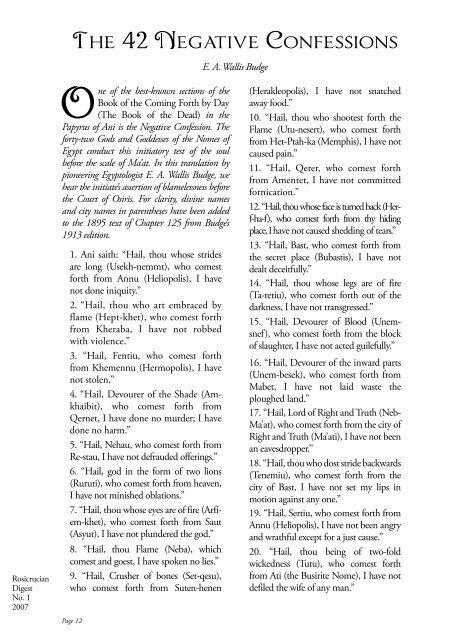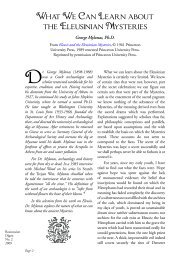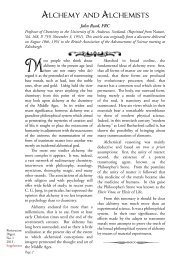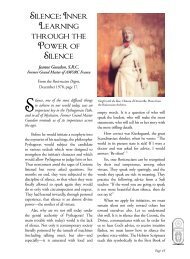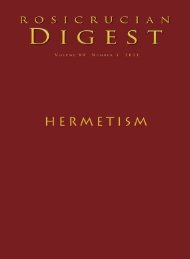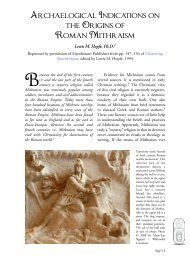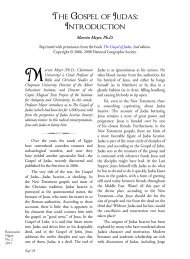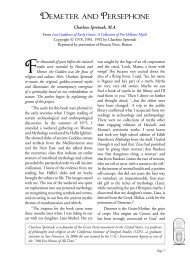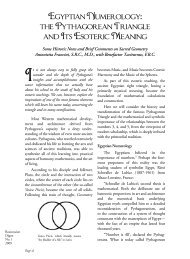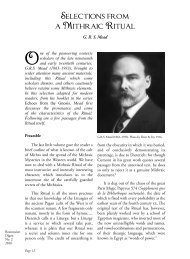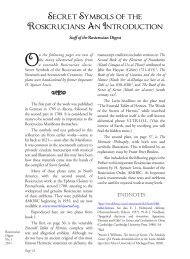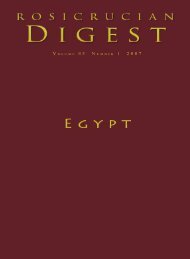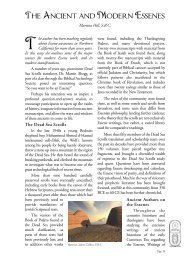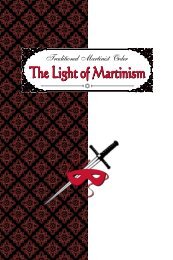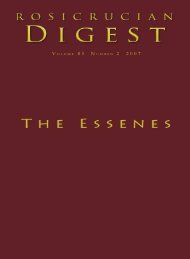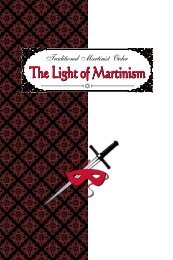The 42 Negative Confessions - Rosicrucian Order
The 42 Negative Confessions - Rosicrucian Order
The 42 Negative Confessions - Rosicrucian Order
You also want an ePaper? Increase the reach of your titles
YUMPU automatically turns print PDFs into web optimized ePapers that Google loves.
<strong>Rosicrucian</strong><br />
Digest<br />
No. 1<br />
2007<br />
One of the best-known sections of the<br />
Book of the Coming Forth by Day<br />
(<strong>The</strong> Book of the Dead) in the<br />
Papyrus of Ani is the <strong>Negative</strong> Confession. <strong>The</strong><br />
forty-two Gods and Goddesses of the Nomes of<br />
Egypt conduct this initiatory test of the soul<br />
before the scale of Ma’at. In this translation by<br />
pioneering Egyptologist E. A. Wallis Budge, we<br />
hear the initiate’s assertion of blamelessness before<br />
the Court of Osiris. For clarity, divine names<br />
and city names in parentheses have been added<br />
to the 1895 text of Chapter 125 from Budge’s<br />
1913 edition.<br />
1. Ani saith: “Hail, thou whose strides<br />
are long (Usekh-nemmt), who comest<br />
forth from Annu (Heliopolis), I have<br />
not done iniquity.”<br />
2. “Hail, thou who art embraced by<br />
flame (Hept-khet), who comest forth<br />
from Kheraba, I have not robbed<br />
with violence.”<br />
3. “Hail, Fentiu, who comest forth<br />
from Khemennu (Hermopolis), I have<br />
not stolen.”<br />
4. “Hail, Devourer of the Shade (Amkhaibit),<br />
who comest forth from<br />
Qernet, I have done no murder; I have<br />
done no harm.”<br />
5. “Hail, Nehau, who comest forth from<br />
Re-stau, I have not defrauded offerings.”<br />
6. “Hail, god in the form of two lions<br />
(Ruruti), who comest forth from heaven,<br />
I have not minished oblations.”<br />
7. “Hail, thou whose eyes are of fire (Arfiem-khet),<br />
who comest forth from Saut<br />
(Asyut), I have not plundered the god.”<br />
8. “Hail, thou Flame (Neba), which<br />
comest and goest, I have spoken no lies.”<br />
9. “Hail, Crusher of bones (Set-qesu),<br />
who comest forth from Suten-henen<br />
Page 12<br />
E. A. Wallis Budge<br />
(Herakleopolis), I have not snatched<br />
away food.”<br />
10. “Hail, thou who shootest forth the<br />
Flame (Utu-nesert), who comest forth<br />
from Het-Ptah-ka (Memphis), I have not<br />
caused pain.”<br />
11. “Hail, Qerer, who comest forth<br />
from Amentet, I have not committed<br />
fornication.”<br />
12. “Hail, thou whose face is turned back (Herf-ha-f),<br />
who comest forth from thy hiding<br />
place, I have not caused shedding of tears.”<br />
13. “Hail, Bast, who comest forth from<br />
the secret place (Bubastis), I have not<br />
dealt deceitfully.”<br />
14. “Hail, thou whose legs are of fire<br />
(Ta-retiu), who comest forth out of the<br />
darkness, I have not transgressed.”<br />
15. “Hail, Devourer of Blood (Unemsnef),<br />
who comest forth from the block<br />
of slaughter, I have not acted guilefully.”<br />
16. “Hail, Devourer of the inward parts<br />
(Unem-besek), who comest forth from<br />
Mabet, I have not laid waste the<br />
ploughed land.”<br />
17. “Hail, Lord of Right and Truth (Neb-<br />
Ma’at), who comest forth from the city of<br />
Right and Truth (Ma’ati), I have not been<br />
an eavesdropper.”<br />
18. “Hail, thou who dost stride backwards<br />
(Tenemiu), who comest forth from the<br />
city of Bast, I have not set my lips in<br />
motion against any one.”<br />
19. “Hail, Sertiu, who comest forth from<br />
Annu (Heliopolis), I have not been angry<br />
and wrathful except for a just cause.”<br />
20. “Hail, thou being of two-fold<br />
wickedness (Tutu), who comest forth<br />
from Ati (the Busirite Nome), I have not<br />
defiled the wife of any man.”
21. “Hail, thou two-headed serpent<br />
(Uamemti), who comest forth from the<br />
torture-chamber, I have not defiled the<br />
wife of any man.”<br />
22. “Hail, thou who dost regard what is<br />
brought unto thee (Maa-antuf), who<br />
comest forth from Pa-Amsu (Panopolis),<br />
I have not defiled myself.”<br />
23. “Hail, thou Chief of the mighty (Heruru)<br />
who comest forth from Amentet<br />
(Nehatu), I have not caused terror.”<br />
24. “Hail, thou Destroyer (Khemiu),<br />
who comest forth from Kesiu, I have not<br />
transgressed (the law).”<br />
25. “Hail, thou who orderest speech<br />
(Shet-kheru), who comest forth from<br />
Urit, I have not burned with rage.”<br />
26. “Hail, thou Babe (Nekhenu), who<br />
comest forth from Uab (Heqat), I have<br />
not stopped my ears against the words of<br />
Right and Truth.”<br />
27. “Hail, Kenemti, who comest forth<br />
from Kenemet, I have not worked grief.”<br />
28. “Hail, thou who bringest thy<br />
offering (An-hetep-f), I have not acted<br />
with insolence.”<br />
29. “Hail, thou who orderest speech<br />
(Sera-kheru), who comest forth from<br />
Unaset, I have not stirred up strife.”<br />
30. “Hail, Lord of faces (Neb-heru), who<br />
comest forth from Netchfet, I have not<br />
judged hastily.”<br />
31. “Hail, Sekheriu, who comest forth from<br />
Utten, I have not been an eavesdropper.”<br />
32. “Hail, Lord of the two horns<br />
(Neb-abui), who comest forth<br />
from Saïs, I have not multiplied<br />
words exceedingly.”<br />
33. “Hail, Nefer-Tmu, who comest forth<br />
from Het-Ptah-ka (Memphis), I have<br />
done neither harm nor ill.”<br />
34. “Hail, Tmu in thine hour, who<br />
comest forth from Tattu (Busiris), I have<br />
never cursed the king.”<br />
35. “Hail, thou who workest with<br />
thy will (Ari-em-ab-f ), who comest<br />
forth from Tebu, I have never fouled<br />
the water.”<br />
36. “Hail, thou bearer of the sistrum<br />
(Ahi), who comest forth from Nu, I have<br />
not spoken scornfully.”<br />
37. “Hail, thou who makest humanity to<br />
flourish (Uatch-rekhit), who comest forth<br />
from Saïs, I have never cursed God.”<br />
38. “Hail, Neheb-ka, who comest forth<br />
from thy hiding place, I have not stolen.”<br />
39. “Hail, Neheb-nefert, who comest<br />
forth from thy hiding place, I have not<br />
defrauded the offerings of the gods.”<br />
40. “Hail, thou who dost set in order the<br />
head (Tcheser-tep), who comest forth<br />
from thy shrine, I have not plundered the<br />
offerings to the blessed dead.”<br />
41. “Hail, thou who bringest thy arm<br />
(An-af), who comest forth from the city<br />
of Ma’ati, I have not filched the food of<br />
the infant, neither have I sinned against<br />
the god of my native town.”<br />
<strong>42</strong>. “Hail, thou whose teeth are white<br />
(Hetch-abhu), who comest forth from<br />
Ta-she (the Fayyum), I have not<br />
slaughtered with evil intent the cattle of<br />
the god.”<br />
“. . . I have tried thee. . . Advance thou,<br />
in very truth thou hast been tested.”<br />
Detail of a Coffin. <strong>The</strong> god Thoth, or Djehuti in ancient Egyptian, was<br />
the Scribe of Judgment. When the deceased made the <strong>Negative</strong><br />
Declaration asserting a life well-lived, Djehuti took notes. From the<br />
collection of the <strong>Rosicrucian</strong> Egyptian Museum.<br />
Page 13


